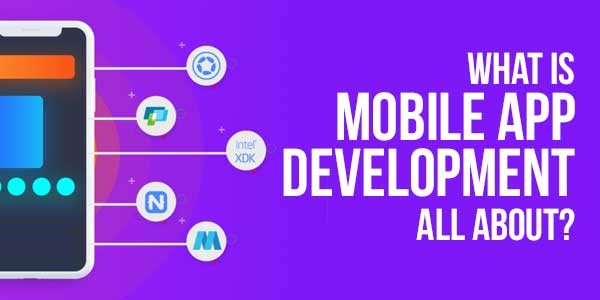
Mobile apps are already at the centre of everything in our life. Everything people do or go through has a mobile app for it. There are close to 7 million mobile apps and still counting across iOS and Android platforms. This is also why mobile apps are facing competition like never before.
If you have a great app idea and want to build an app, you need to consider a few things for shaping the opinion into an app with perfection. First, you need to have a solid command of the basics of mobile app development, starting with the choice of platform, technology stack and app features. So, let’s discuss these fundamental things about app development.
Table of Contents
Choosing The Platform:
You have two platform choices at your disposal, iOS and Android. You can either build separate apps for these two platforms (native development) or you can build one app that runs on all platforms (hybrid development), or you can build one app with separate UI layers for two platforms (cross-platform development). Let’s discuss these three choices of app development here.
Native Development:
It is also basically platform-specific app development that adheres to the guidelines and restrictions corresponding to particular OS platforms. As per this approach, you need to build separate iOS and Android versions of your app.
The key advantages that make native apps popular include the following.
- Native apps completely align with the specific requirements of the particular OS platform and hence offers better performance, speed and user experience.
- Native apps by aligning with the security guidelines of the platform ensure far better security.
- Native apps allow smooth utilization of the device features and OS functions.
- Native apps get streamlined over the air updates with the new updates of the OS platforms.
The only negative factors that prevent app projects from embracing this approach are higher development time and cost. Building two separate apps tuned to two different OS platforms requires more time and effort.
Hybrid Development:
Hybrid development refers to building one single app that can run on multiple platforms. Hybrid apps can also run on web browsers and desktop platforms besides iOS and Android.
Let’s have a quick look at the key advantages of hybrid development.
- Hybrid apps allow clubbing the entire development time and cost required for separate platforms into one, thus saving a significant amount of time and cost.
- Hybrid apps generally use common web technologies such as HTML, JavaScript, CSS, and UI frameworks for mobile conversions. This ensures the easy availability of development resources.
- Hybrid apps with integrated cloud support ensure smooth accessibility anytime and anywhere.
Hybrid apps are typically a “one size fits all” approach to mobile app development that comes with various flaws. Hybrid apps are likely to offer compromising app performance, and user experience as these apps cannot be fully aligned with the native platforms.
Cross-Platform Development:
Cross-platform development refers to building an app that utilizes maximum code across iOS and Android platforms but incorporates native UI later separately for each platform. This approach brings the best of both hybrid and native app development together.
Some of the key advantages that made cross-platform development so popular include the following.
- Faster development and reduced cost thanks to maximum reusability of the code across platforms.
- It brings the power of native development by using the native UI layer separately on iOS and Android and hence offers native performance and user experience.
- Cross-platform apps offer more consistency in terms of user experience across multiple platforms.
Though cross-platform development is a viable and better alternative to hybrid development as far as performance and user experience are considered, this approach still lags behind native development.

Choosing The Right Technology Stack
Now that you have gone through several different considerations for the platform choice, it is time to understand the technology stack required for app projects separately comprehensively.
Android Stack:
For native Android development, you need either Java or Kotlin language. For Android development IDE, you need to use Android Studio. Finally, for frameworks and templating engines, you have choices such as Jetpack Compose and Android UI.
iOS Stack:
For native iOS development, you need to use either Objective-C or Swift programming language. Other tools and IDE choices include Xcode or AppCode. As for UI frameworks, you have choices like UIKit and SwiftUI.
Cross-Platform Stack:
For cross-platform app projects targeting iOS and Android platforms, you have libraries and frameworks such as React Native, Flutter, Xamarin, and Kotlin Multiplatform. These frameworks and libraries are pretty comprehensive to provide you everything starting from core coding to integrated IDE, native UI template engine, to bug testing tools.
Choosing The App Features:
Now that you have made your choice of platform and technology stack, you need to choose the key features that define the user experience of your app project best. Here’s how you need to choose the core app features for your app project.
Prioritizing The Key Features:
Which features best describe the elementary functional offerings of your app? You need to find them and give them a priority for releasing the app. You can add more value with features and UI/UX elements subsequently through each app update. So, ensure releasing the app with core features and user feedback, make changes, and add more through subsequent updates. This will give you better control over your app project.
Aligning With The Device Functions:
Ensure the app version perfectly aligns with the key device features and functions, offering a smooth user experience. In addition, make sure the chosen app features can perfectly utilize the scope offered by the respective OS platforms and device features.
Offline Access:
People prefer apps that allow offline access to the content and key features. So, when building an app, if you can accommodate offline access for certain features and app content, it will boost the app user experience.
Conclusion:
Every mobile app is unique, and hence you should take these guidelines and suggestions as the basics. Obviously, you can tweak things around and have your approach to build an app product that stands out from the completion.

 About the Author:
About the Author:












the very nice article very informative and helpful. Thanks for sharing such a knowledgeful article.
Welcome here and thanks for reading our article and sharing your view. This will be very helpful to us to let us motivate to provide you with more awesome and valuable content from a different mind. Thanks again.
This is really good post for know about mobile app development.
Welcome here and thanks for reading our article and sharing your view. This will be very helpful to us to let us motivate to provide you with more awesome and valuable content from a different mind. Thanks again.